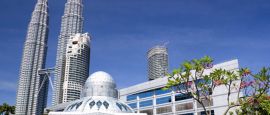Malaysia is a land of vibrant and diverse festivals, reflecting its multicultural heritage. Major celebrations include Thaipusam, a Hindu festival marked by colourful processions and rituals, and Chinese New Year, celebrated with lion dances, family gatherings, and fireworks. Hari Raya Aidilfitri and Hari Raya Haji are significant Malay-Muslim festivals featuring feasts, prayers, and open houses. Other highlights include the Mid-Autumn Festival, Deepavali (Festival of Lights), and Gawai and Kaamatan, harvest festivals celebrated in Sarawak and Sabah, respectively. These festivities showcase Malaysia's rich cultural tapestry and warm hospitality.
Malaysia things to see and do
Endau-Rompin National Park, spanning the states of Johor and Pahang, is Malaysia's second-largest national park (after Taman Negara). Endau-Rompin is known for its ancient rainforests, rare plant species, cascading waterfalls, and dramatic rock formations. The main entry points are Kampung Peta (in Johor) and Selai (in Pahang), where visitors can access trekking trails and guided tours. Highlights include the spectacular Buaya Sangkut Waterfall, a challenging trek rewarded with breathtaking views, and the scenic Takah Tinggi and Takah Pandan Waterfalls.
Malaysia's dynamic capital is a mix of modern skyscrapers, colonial landmarks, and diverse cultural attractions. The Petronas Twin Towers dominate the skyline, while Merdeka Square, the Sultan Abdul Samad Building, and Carcosa Seri Negara offer a glimpse into the city's colonial past. For a different experience, visit the Batu Caves, a spectacular limestone cave temple and an important Hindu pilgrimage site. Kuala Lumpur is also renowned for its shopping, with mega malls such as Pavilion KL, Mid Valley Megamall, and 1 Utama among the most popular destinations for both locals and visitors.
Malaysia has 42 islands gazetted as Marine Parks to protect its stunning underwater ecosystems. Highlights include the Tunku Abdul Rahman Marine Park and Tun Sakaran Marine Park in Sabah, the Redang Marine Park in Terengganu, and the Tioman Island Marine Park in Pahang. Each offers excellent diving and snorkelling opportunities, while showcasing vibrant coral reefs and diverse marine life.
Melaka City, the tiny capital of Melaka state, is a UNESCO World Heritage site (jointly listed with George Town, Penang) steeped in colonial history. Portuguese, Dutch, and British influences are evident in landmarks such as A Famosa Fort and the Stadthuys (Red Square). Visitors can also stroll along Jonker Street, which is famous for its lively night market, antique shops, and local delicacies. For a different perspective, the Melaka River Cruise offers a scenic journey through the city's rich past and vibrant present.
The best places to see orangutans in Malaysia are in Sabah on the island of Borneo. The Sepilok Orangutan Rehabilitation Centre near Sandakan is world-renowned for its conservation efforts, where visitors can observe semi-wild orangutans in their natural habitat. Another excellent spot is the Lower Kinabatangan River, where river cruises offer the chance to see these magnificent primates in the wild. In addition, visitors can also spot orangutans in Batang Ai National Park, Sarawak.
Penang is a cultural and culinary haven famous for its UNESCO-listed George Town. The historic streets are lined with charming colonial-era buildings, temples, and mosques, and the street art trail adds a vibrant, creative touch to the cityscape. Worthy diversions include the scenic Penang Hill, offering panoramic views of the island, and the Penang National Park. Penang's street food is legendary, often considered the best in Malaysia. The culinary offerings are a feast for the senses, blending Chinese, Malay, and Indian influences into unforgettable flavours.
Sabah is an adventurer's paradise, boasting Mount Kinabalu, Southeast Asia's tallest peak. The state is famous for its pristine islands, such as Sipadan for diving and Tunku Abdul Rahman Marine Park for snorkelling. Wildlife enthusiasts can visit the Sepilok Orangutan Rehabilitation Centre and cruise along the Kinabatangan River to spot pygmy elephants and proboscis monkeys. Beyond its natural attractions, traditional Kadazan-Dusun villages and local markets provide a glimpse into the state's rich cultural heritage.
Sarawak is the largest state in Malaysia, renowned for its untamed rainforests and remarkable biodiversity. Its many national parks offer unforgettable experiences: spotting proboscis monkeys at Bako National Park, uncovering ancient human history at Niah National Park, and exploring dramatic limestone caves at Gunung Mulu National Park. Sarawak's rich tribal heritage, including the cultures of the Iban and Bidayuh, is preserved in traditional longhouses, where visitors can immerse themselves in the customs and lifestyles of its indigenous communities. The state capital, Kuching, is a charming riverside city with a relaxed atmosphere.
Taman Negara is one of the world's oldest rainforests and a sprawling national park that spans the states of Pahang, Kelantan, and Terengganu. The park's main entry point is Kuala Tahan, where visitors can access a variety of trails, guided tours, and activities. The canopy walkway (one of the longest in the world), jungle trekking to Bukit Teresek, and the Lata Berkoh rapids are must-visit spots. Join a night safari or jungle walk, and lucky visitors may also encounter tapirs, hornbills, and even the elusive Malayan tiger.
Terengganu is renowned for its stunning islands, particularly Redang and the Perhentian Islands, which are famous for their crystal-clear waters and vibrant marine life. The state is also home to Kenyir Lake, a sprawling man-made reservoir surrounded by lush rainforests, perfect for boating, fishing, and wildlife spotting. Another highlight is witnessing sea turtles laying eggs on its beaches, a mesmerising natural event that draws visitors to locations like Rantau Abang during nesting season.
Do you have any Feedback about this page?
© 2026 Columbus Travel Media Ltd. All rights reserved. No part of this site may be reproduced without our written permission, click here for information on Columbus Content Solutions.








 You know where
You know where
